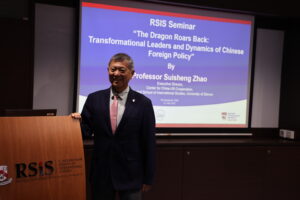Abstract
Professor Zhao will draw on his new book, The Dragon Roars Back: Transformational Leaders and Dynamics of Chinese Foreign Policy to trace the dramatic shifts in China’s foreign policy since its founding in 1949 and the key roles played by Mao Zedong, Deng Xiaoping, and Xi Jinping. Each of these transformational leaders reshaped foreign policy to better fit their aims for China. His presentation will focus on Xi Jinping’s power concentration and its implications for Chinese foreign policy.
About the Speaker
 Suisheng Zhao is Professor and Director of the Center for China-US Cooperation at Josef Korbel School of International Studies, University of Denver. A founding editor of the Journal of Contemporary China, he is member of the Board of Governors of the US Committee of the Council for Security Cooperation in the Asia Pacific, a member of National Committee on US-China Relations, a Research Associate at the Fairbanks Center for East Asian Research in Harvard University, and an honorary professor at various universities in China. He received his Ph.D. degree in political science from the University of California-San Diego. He is the author and editor of more than ten books, including: China and East Asian Regionalism: Economic and Security Cooperation and Institution-Building (Routledge 2012), In Search of China’s Development Model: Beyond the Beijing Consensus, (Routledge 2011), China and the United States, Cooperation and Competition in Northeast Asia (Palgrave/Macmillion, 2008), China-US Relations Transformed: Perspectives and Strategic Interactions (Routledge, 2008), and A Nation-State by Construction: Dynamics of Modern Chinese Nationalism (Stanford University Press, 2004). His articles have appeared in Political Science Quarterly, The Wilson Quarterly, Washington Quarterly, International Politik, The Hague Journal of Democracy, European Financial Review, The China Quarterly, World Affairs, Asian Survey, Asian Affairs, Journal of Democracy, Pacific Affairs, Communism and Post-Communism Studies, Problems of Post-Communism, and elsewhere.
Suisheng Zhao is Professor and Director of the Center for China-US Cooperation at Josef Korbel School of International Studies, University of Denver. A founding editor of the Journal of Contemporary China, he is member of the Board of Governors of the US Committee of the Council for Security Cooperation in the Asia Pacific, a member of National Committee on US-China Relations, a Research Associate at the Fairbanks Center for East Asian Research in Harvard University, and an honorary professor at various universities in China. He received his Ph.D. degree in political science from the University of California-San Diego. He is the author and editor of more than ten books, including: China and East Asian Regionalism: Economic and Security Cooperation and Institution-Building (Routledge 2012), In Search of China’s Development Model: Beyond the Beijing Consensus, (Routledge 2011), China and the United States, Cooperation and Competition in Northeast Asia (Palgrave/Macmillion, 2008), China-US Relations Transformed: Perspectives and Strategic Interactions (Routledge, 2008), and A Nation-State by Construction: Dynamics of Modern Chinese Nationalism (Stanford University Press, 2004). His articles have appeared in Political Science Quarterly, The Wilson Quarterly, Washington Quarterly, International Politik, The Hague Journal of Democracy, European Financial Review, The China Quarterly, World Affairs, Asian Survey, Asian Affairs, Journal of Democracy, Pacific Affairs, Communism and Post-Communism Studies, Problems of Post-Communism, and elsewhere.



 Add to Google calendar
Add to Google calendar
 Add to Outlook calendar
Add to Outlook calendar

